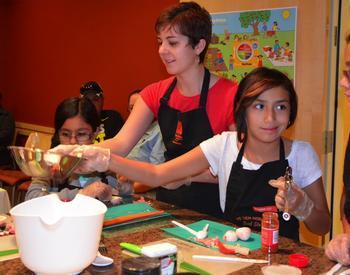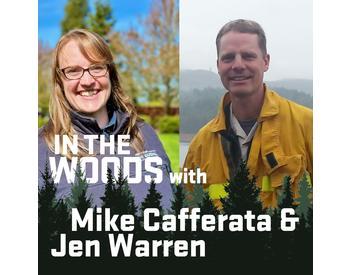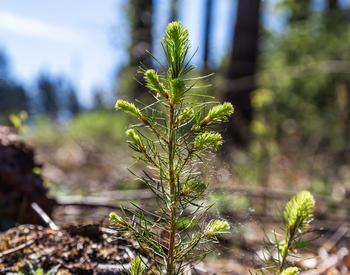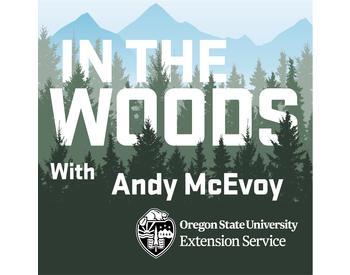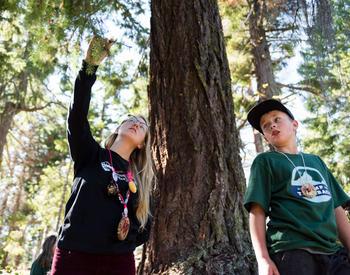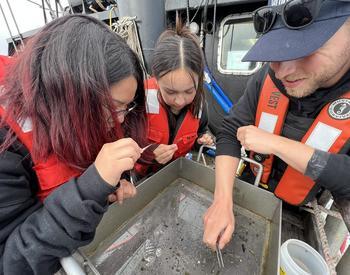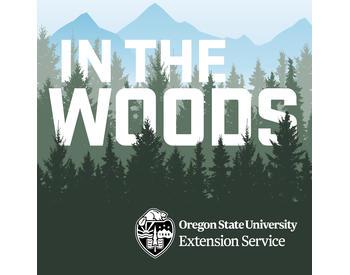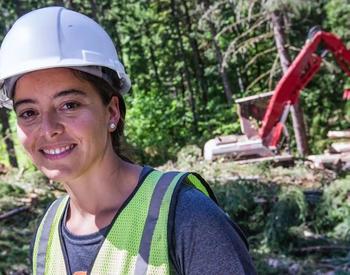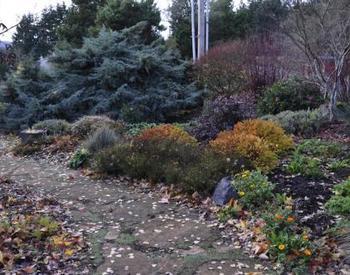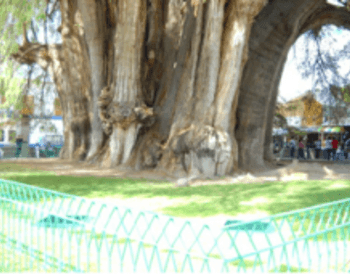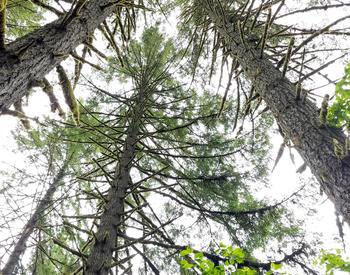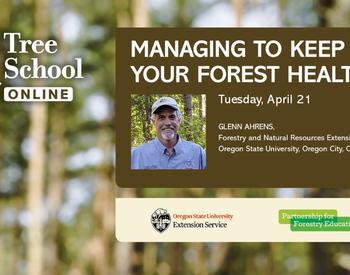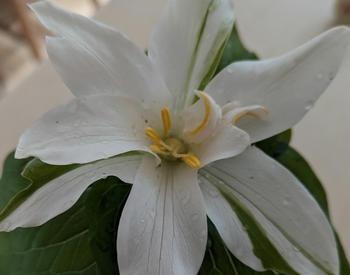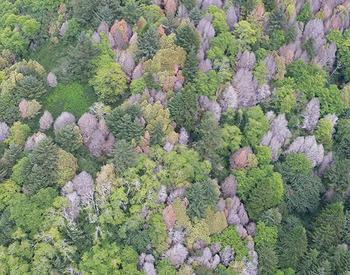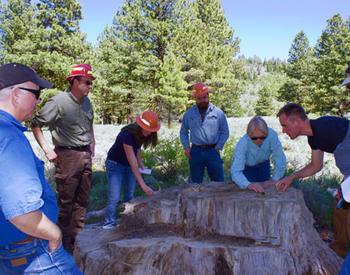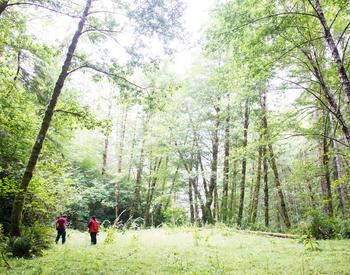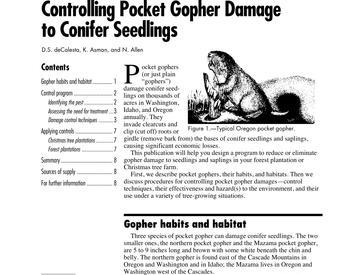Transcript
From the Oregon State University's Extension Service, you are listening to In the Woods with the Forestry and Natural Resources Program. This podcast aims to share the voices of researchers, land managers, and members of the public interested in telling the story about woodlands provide more than just trees.
They provide interconnectedness that is essential to your daily life. Stick around to discover a new topic related to forests on each episode. Welcome back to the In the Woods Podcast, presented by the Forestry and Natural Resources Extension Program at Oregon State University. I'm Scott Leavengood, extension specialist in wood products, and I'm at the annual Tree School event at Clackamas Community College near Portland.
Where I'm standing now, was buzzing with activity just a few minutes ago, and maybe you can still hear a little bit of background noise. Most of the participants are now participating in one of the many educational courses being offered today. So this provides me an opportunity to talk with my coworkers, Glenn Ahrens and Sarah Cameron.
And these two are the dynamic duo. They head up this event. Glenn, please introduce yourself and tell our audience a bit about what you do. Well, hi, I'm Glenn Ahrens I'm the OSU Extension Forester up here in Clackamas, Marion and Hood River Counties. And uh, what I do is forest reeducation from A to Z cradle to grave. But Tree School is a focus on a big audience for OSU Extension, which are private woodland owners, family forest owners, uh, in Oregon and beyond.
And so organizing Tree School, uh, is a big part of what I do. And Glenn, you've, uh, you've been here for a little while, is that right? Well, I started as an extension forester, uh, in 2001. Uh, I've been here in Clackamas uh, since 2012. So yeah, I've been here a while. Been here. All right. And how about you, Sarah?
Tell the audience a bit about yourself as well. Thanks for having us, Scott. My name is Sarah Cameron. I am a forestry program assistant here in Clackamas County. Uh, a lot of the time my job revolves around Tree School, but I also help Glenn with whatever's on his roster. And I also coordinate a small community science project called Oregon Season Tracker.
Great. Thank you. And now Tree School. We've talked about, we've used that term a few times, but maybe some of our listeners aren't familiar with what it is. So, Sarah, how do you describe this event to someone who's never heard of it? So one description I've heard that I like a lot is that it's a mini college for landowners, which is fitting for today as we literally take over the Clackamas Community College for the day for Tree School.
We have a wide variety of instructors and class topics, and so students register for four classes during the day. Uh, so each one has a unique schedule. And then we also have a lot of local vendors and exhibitors, and there's a lot of time for just networking and connecting with other landowners throughout the day.
All right, great. Thanks Sarah. Glenn, this is, uh, Tree School's been going on for a while, if I'm not mistaken. When was the first Tree School? The first Tree School was in 1991, so this is the 33rd annual Tree School in Clackamas County. Wow. Wow. That's quite a, quite some longevity there. And Sarah, are there other Tree School events around Oregon in the northwest?
So right now we only have Tree Schools here in Oregon, but there's a lot of other great extension landowner outreach programs around the northwest. And for Tree Schools this year we also have a Tree School east occurring in Baker City on June 30th. Uh, and then we also plan to have a Tree School field day back here in Clackamas County in the fall.
Uh, Tree School Clackamas is an annual event, but then we also have a lot of regional Tree Schools that kind of move around throughout the state, uh, year to year. And the website, the Tree School website is a great place to catch up on what's, what's happening next. Excellent. All right, and how many people are registered for this event that we're at today?
So we have about 750 people here today. I think about 640 of those are taking classes. Um, but also lots of instructors, exhibitors, and volunteers helping us pull it together. All right. Well that makes me thankful that we found a quiet time to do this cuz we never would've been able to hear you here just about, uh, 15, 20 minutes ago with all those people.
And, uh, Glenn, how many courses are on the agenda and how many instructors are there? Do you have that, that date off the top of your head? Uh, pretty close. Uh, we, we have 68 courses was the full description. Uh, I think a couple have dropped. Uh, today was a snow day of all things. Uh, so I think we're at 66 classes that we're delivering today.
And, uh, it's about 80 instructors and assistants helping those instructors, uh, to put this all together. Many of those, uh, like yourself, uh, are from OSU Extension, uh, or OSU College of Forestry. But we also engage a lot of partners in forestry education from around the state, um, and also some of the federal folks.
All right. Now for both of you, we'll start with Sarah. What's the coolest thing about Tree School? What gets you excited about it? I think really just like the atmosphere and the feel of Tree School when you're here during the day. Um, since I started working here, just seeing how much people light up when they talk about Tree School.
Uh, and it's just really special to be a part of pulling that together. And how about you, Glenn? Yeah, it, it's, it's really a similar thing. It's just this energy, the high energy and the enthusiasm and a lot of smiling people. Um, they don't know what goes on behind the scenes as far as us, you know, struggling with little things.
But overall there's just a lot of great positive, uh, comments. And then just the energy of all the people together. Uh, and this year, after four years since Covid, where we, we went online for three years, uh, so that we still had three school technically, but this year, back in person, even more enthusiasm.
And, and, and also after Tree School, when I meet people in the field or at another class, they talk about Tree School and, and they come again because they can only take four classes at a time and we got 60 or 70 classes, so they have to keep coming back year after year. So sounds like you gotta come about 15 or 16 years in a row to catch 'em all then.
Yeah. Well here, before we wrap up this episode, I have a few more questions for you and what we call the lightning round.
The first question is always, what is your favorite tree species? We'll start with you, Sarah. I've always had an affinity for quaking aspen. Um, I'm originally from the Midwest and they were one of my favorite trees out there, and I think it's just really special to catch little pockets of them out here too.
And, uh, how about you, Glenn, your favorite tree species? I think my answer changes, uh, seasonally, but um, I went to, uh, Humboldt State University and I'm kind of a home in the Redwood, so today, uh, coast redwood, I'm thinking about that tree. Long lived. Amazing tree, uh, fire resistant, which we may need in the future.
Uh, maybe even better adapted for Oregon someday, although it is native here in southwest Oregon. So coast redwood for today. Yeah, and I was actually just in the climate smarter forestry session and that one came up, coast redwood and sequoias came up more than once.
Sarah, what is a unique tool that you use that helps you with your work?
I wish I had a more exciting answer for this one, but these last few weeks has definitely just been a lot of spreadsheets, uh, a lot of emails in my inbox, but another part of my job is with Oregon season trackers, so using rain gauges to help volunteers monitor precipitation. Um, I would say that's a pretty unique one.
Definitely. And how about you, Glenn? A unique tool that helps you with your work? You know, I'm gonna go two ways. One is all the new, uh, tools that I'm learning to use, uh, with digital, uh, media and computers because I need 'em in my life. A lot of my life is spent there. And then the other end of the spectrum is I have a really cool hand tool I won at a raffle.
It's like a special kind of a, of a brush cutter with a long handle comfortable grip and a nice little hook on the end. It's really good for dealing with, you know, blackberries and grass so. Like a putter, but for removing brush. Yeah. It's a little easier than the old-fashioned side or sickle that I used to use.
Okay. And not so noisy and smelly as a weed whacker. Yeah. Perfect. All right. Lastly, what other resources can you share for a listener that would like to dive deeper on Tree School? I think you've already talked about it, Sarah, the website, but we, we can get that posted, but if something else you can think of here.
Oh, yeah. So Tree School online, Glenn mentioned this. We have a series of, it's over 50 webinars that are free to watch anytime on the OSU extension website. It's a huge variety of topics. Some of them are Tree School favorites. Um, so yeah, those are free. Um, would encourage checking those out and just learning some more about what we have to offer here at Tree School.
Excellent. Glenn, you get the final words here, or nearly? Well, there's nothing like a good field workshop, uh, and Tree School in the field, another whole day in the field at Hopkins Demonstration Forest in October. Right. Perfect. Glenn, Sarah, thanks so much for spending time with me today and what I know is one of the busiest days of the year for you.
And I'll sign off. Thanks for participating in, uh, In the Woods.
Thank you so much for listening. Show notes with links mentioned on each episode are available on our website inthewoodspodcast.com. We would love to hear from you, visit the tell us what you think tab on our website to leave us a comment, suggest just a guest or topic, or ask a question that can be featured in a future episode. And, also, give us your feedback by filling out our survey.
In the Woods was created by Lauren Grand, Jacob Putney, Carrie Berger, Jason O'Brien and Stephen Fitzgerald, who are all members of the Oregon State University Forestry and Natural Resources Extension team. Episodes are edited and produced by Kellan Soriano. Music for In the Woods was composed by Jeffrey Hino and graphic design was created by Christina Friehauf.
We hope you enjoyed the episode and we can't wait to talk to you again next month, until then what's in your woods?
In this episode, Scott Leavengood visits the 33rd annual Clackamas Tree School to interview Sarah Cameron and Glenn Ahrens about what the event is and why it's so beneficial.
